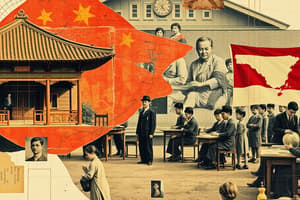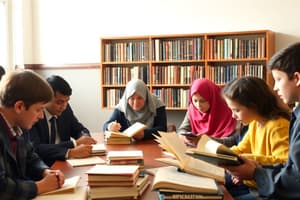Podcast
Questions and Answers
What is a significant challenge related to educational technology integration?
What is a significant challenge related to educational technology integration?
- Ensuring all students have the same learning pace
- Implementing curriculum changes quickly
- Reducing the use of traditional teaching methods
- Addressing diverse learning needs and technical skills (correct)
Which factor is primarily linked to the lack of equitable access to quality education?
Which factor is primarily linked to the lack of equitable access to quality education?
- Curriculum design
- Teacher engagement levels
- Socioeconomic disparities (correct)
- Student motivation
Personalized learning focuses on which of the following?
Personalized learning focuses on which of the following?
- Tailoring instruction to individual needs (correct)
- Focusing solely on exam preparation
- Standardizing assessments for all students
- Encouraging group-based learning only
What is a primary concern regarding teacher shortages in education?
What is a primary concern regarding teacher shortages in education?
Which of the following trends emphasizes the need for skills relevant to the 21st century?
Which of the following trends emphasizes the need for skills relevant to the 21st century?
What aspect of education predominantly emerged after the Industrial Revolution?
What aspect of education predominantly emerged after the Industrial Revolution?
Which type of education is characterized by structured learning with defined curricula and qualifications?
Which type of education is characterized by structured learning with defined curricula and qualifications?
What key concept refers to the methods and strategies employed in teaching?
What key concept refers to the methods and strategies employed in teaching?
Which of the following does not lead to formal qualifications?
Which of the following does not lead to formal qualifications?
Which of the following best describes a goal of modern education systems?
Which of the following best describes a goal of modern education systems?
Which learning theory emphasizes the role of social interaction in learning?
Which learning theory emphasizes the role of social interaction in learning?
What does the curriculum primarily outline in an educational setting?
What does the curriculum primarily outline in an educational setting?
Which educational approach incorporates traditional knowledge and practices?
Which educational approach incorporates traditional knowledge and practices?
Flashcards
Equity in Education
Equity in Education
Ensuring all students have equal access to quality education, regardless of background.
Personalized Learning
Personalized Learning
Adapting teaching methods to meet individual student needs
21st Century Skills
21st Century Skills
Skills like critical thinking, problem-solving, and communication, needed for the modern world
Teacher Shortages
Teacher Shortages
Signup and view all the flashcards
Access to Quality Ed.
Access to Quality Ed.
Signup and view all the flashcards
Formal Education
Formal Education
Signup and view all the flashcards
Informal Education
Informal Education
Signup and view all the flashcards
Non-formal Education
Non-formal Education
Signup and view all the flashcards
Indigenous Education
Indigenous Education
Signup and view all the flashcards
Pedagogy
Pedagogy
Signup and view all the flashcards
Curriculum
Curriculum
Signup and view all the flashcards
Assessment
Assessment
Signup and view all the flashcards
Learning Theories
Learning Theories
Signup and view all the flashcards
Study Notes
Historical Overview of Education
- Education systems have evolved significantly over time, reflecting changing societal needs and values.
- Early forms of education focused on practical skills and knowledge transmission within families and communities.
- Formal schooling emerged later, often tied to religious institutions or elite groups.
- The Industrial Revolution and subsequent economic changes led to an expansion of public education systems.
- Modern education systems are increasingly diverse, encompassing various levels and types of institutions.
Different Types of Educational Systems
- Formal education: Structured learning within institutions like schools, colleges, and universities, with defined curricula, qualifications, and assessment methods.
- Informal education: Learning that occurs outside of formal settings, often through experiences, interactions, and self-directed activities. This includes mentorship, community learning, and online resources.
- Non-formal education: Educational activities that are organized but do not lead to formal qualifications. Example includes workshops, training courses, and community programs.
- Indigenous education: Culturally specific approaches to pedagogy and curriculum often incorporating traditional knowledge and practices.
Key Educational Concepts
- Pedagogy: The art and science of teaching, involving methods, strategies, and techniques for effective knowledge transmission and skill development.
- Curriculum: The planned sequence of instruction covering specific subject areas and learning objectives across different levels of education.
- Assessment: The process of evaluating student learning through various methods like testing, projects, and presentations, to measure progress and identify areas for improvement.
- Learning theories: Different psychological theories explain how individuals learn and develop. Examples include behaviorism, cognitivism, constructivism, and connectivism.
Educational Goals and Outcomes
- Developing critical thinking skills: Enabling students to analyze, evaluate, and solve problems effectively.
- Fostering creativity and innovation: Encouraging inventive thinking and problem-solving strategies.
- Promoting social-emotional learning: Teaching students about self-awareness, empathy, and responsible behavior.
- Building character and values: Developing moral compass and ethical decision-making abilities.
- Acquiring knowledge and skills: Preparing students with necessary skills for future success.
- Achieving equity and inclusion: Ensuring that all students have access to quality education, regardless of background, socioeconomic status, or other factors.
Challenges in Education
- Access to quality education: Not all students have equitable access to high-quality schools, teachers, and resources.
- Funding and resources: Adequate funding is crucial for successful educational environments.
- Teacher shortages and quality: A shortage of qualified teachers can impact student learning.
- Educational technology: Integrating technology effectively into education necessitates consideration for diverse learning needs and technical skills.
- Standardized testing and accountability: Balance between standardized testing and more holistic assessment methods.
- Socioeconomic disparities: A major factor impacting educational opportunities and outcomes.
- Cultural sensitivity: Recognition of varying cultural backgrounds and their influence on learning styles.
- Learning differences: Addressing diverse learning styles is vital for an inclusive environment.
Future Trends in Education
- Personalized learning: Tailoring instruction and learning experiences to meet individual needs and learning styles.
- Online and blended learning: Increased use of technology in educational settings.
- Internationalization and global citizenship: Fostering understanding and cooperation among different cultures.
- Emphasis on digital literacy: Preparing students for the modern digital world.
- Development of 21st-century skills: Focusing on critical thinking, problem-solving, communication, and collaboration.
- Lifelong learning: Embracing continuous learning and development throughout one's life.
Studying That Suits You
Use AI to generate personalized quizzes and flashcards to suit your learning preferences.




